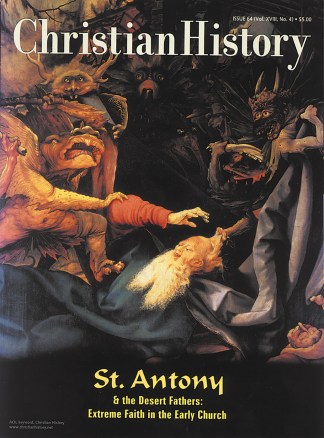“After the peace of the church when the supreme test of martyrdom was no longer demanded,” writes historian Christopher Dawson, “the ascetics had come in the eyes of the Christian world to hold the position the martyrs had formerly occupied as the living witnesses of the faith and the reality of the supernatural world.”
Other historians note an increasing laxity of devotion in the church, and see the monastic movement as an attempt to live out the demands of the gospel more literally.
Then again, the pioneers of the movement all began their desert lives before the “peace of the church,” before things went supposedly lax. Antony took up asceticism over four decades before the persecution of Christians ceased, and he visited a number of Christian hermits who had already been living apart from society for years.
There seems to have been, then, some other motive driving Christians to abandon family and property and pray their days away.
For some, it was clearly an attempt to earn God’s favor, a classic case of “works righteousness.” For others, it was clearly an expression of spiritual pride, an attempt to be one up on fellow believers. For others still—let’s call them the kooks—it was a great way to work out their pathologies.
But I, for one, believe most monks yearned to know and love God in a way that was not possible in the hubbub of city life. Furthermore, I believe their disciplines allowed them to discover something about God that cannot be discovered unless one does what they did.
That time seems to be one of those moments when men and women touched the hem of God’s garment in a special way. In this issue, we are merely trying to touch the hem of the robes of those men and women.
Questions to answer
The ultimate question this topic—early desert monasticism—raises is, What should we make of it all? Was this movement ultimately a force for good or for ill? Did men like Antony promote the gospel or hinder it? Are these desert fathers (and a few mothers) godly models to emulate or misguided enthusiasts to pity?
These questions are not rhetorical; the events may be far away, but the issues early monks addressed are very much alive. How are we to obey Jesus’ command to sell our possessions and follow him (Mark 10:21)? What does Paul mean when he says Christians are to pray unceasingly (1 Thess. 5:17)?
The desert monks took such passages literally. Jesus assumes that Christians will fast (Matt. 6): so did desert fathers. Paul says he disciplined his body, “training it to do what it should do” (1 Cor. 9:27): so did the desert fathers by submitting their bodies to rigorous asceticism.
If they, in fact, understood and obeyed the New Testament on these points, the desert fathers are models we should emulate in some way. If they misunderstood and misapplied these teachings, then we have to do more than scoff at them: we have to explain how such biblical injunctions are to be obeyed faithfully in our own day.
Even more crucial: the desert fathers claim their ascetic methods purified their hearts and led them to a fuller, richer experience of God. Is this true? Or were they deluded? If it’s true, we need to appropriate some of their spirituality. If not, we have to ask why so many men and women spent their entire lives following the rigors of the ascetic way. People are not stupid; they don’t do this sort of thing unless they are getting something out of it. If we decide it wasn’t God, what could it have been?
Before we can answer such ultimate questions, of course, we have to answer the penultimate questions: Who were these men and women? What, in their own terms, were they trying to accomplish? What difference did it make to them and to the social and political world around them?
Such are the questions addressed in this issue, but the ultimate questions always hover in the background. After you’ve read the issue, tell us how you answer one or more of these questions.
Copyright © 1999 by the author or Christianity Today/Christian History magazine. Click here for reprint information on Christian History.










